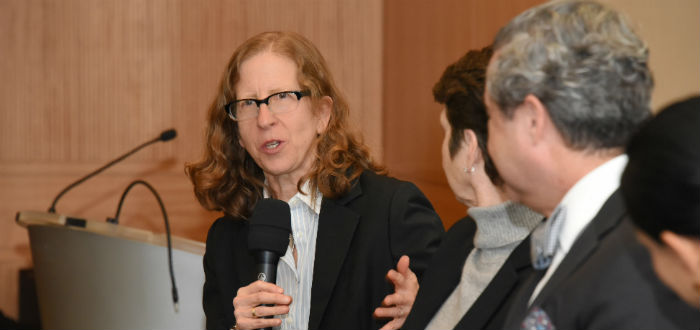What makes a great lawyer? Is it intelligence? An Ivy League education? Toni Jaeger-Fine, assistant dean for international and non-J.D. programs at Fordham Law, would argue that it is neither. She believes what sets apart exceptional legal professionals is their mind-set.
Jaeger-Fine’s new book, Becoming a Lawyer: Discovering and Defining Your Professional Persona, argues that successful lawyers must cultivate their personalities and behaviors as carefully and rigorously as their knowledge and practice of the law. Everyone thus enjoys tremendous control over their success and, ultimately, their happiness.
The book, released in November by Academic West Publishing, celebrated its launch at Fordham on March 27, with a welcome from Dean Matthew Diller and comments from Lisa Jacobs, partner at Shearman & Sterling LLP; Raymond J. Dowd ’91, partner at Dunnington, Bartholow & Miller LLP; Maria-Leticia Ossa Daza ’09, partner at Wilkie Farr & Gallagher LLP; and Mimi Tsankov, an immigration judge at the U.S. Department of Justice.

Becoming a Lawyer is an attempt to bridge the gap between the knowledge students gain in law school and the non-academic, non-technical skills necessary to be an effective, successful lawyer. Though directed at legal professionals, the book’s lessons are easily applicable across multiple fields, as many boil down to honing one’s attitudes and personality for maximum interpersonal effectiveness. Jaeger-Fine acknowledged that the way law is practiced has changed in recent years, and while all law firms employ attorneys who are well-trained in their respective disciplines, some firms have begun to evaluate employees not only on their legal acumen, but also on their managerial, communication, and collaborative skills.
“Lawyers never say to me, ‘I wish recent graduates knew how to write a complaint better,’ or ‘I wish they knew how to draft an interrogatory,’” noted Dean Matthew Diller. “What people say to me, over and over again, is that they wish law schools were better at developing a student’s professional persona.”

According to Jaeger-Fine, three key pillars support this persona—the first, and the foundation for the other two, includes the importance of establishing good habits. Habits, as she realized while working on the book, set one’s overall tone and pace; she stresses that forming strong, positive habits can ensure success. The second is what Jaeger-Fine calls “self-management professionalism,” and includes personal, internal traits like resilience, resourcefulness, and optimism—traits that ultimately inform how people present themselves professionally. The third pillar focuses on external qualities necessary for relationship-building: cooperation, respect, and communication, among others. (She also emphasized the importance of active listening as an integral, oft-forgotten part of effective communication skills.)
At the launch, the panelists agreed that Becoming a Lawyer fills an important void in the field of legal training.
“I wish that someone had written this book long ago,” said Lisa Jacobs, “Because when you come out of law school, you know how to be an excellent student, but you do not know how to be a lawyer.” Judge Tsankov agreed that this book is “the great equalizer” for those entering or already engaged in the profession.
Jaeger-Fine summed up the key takeaway of her book, saying, “A lot of what is behind this book is making that transition from thinking about yourself to realizing that law is ultimately a profession of service, and how to reorient yourself to be the kind of lawyer committed to working for others and making the world a better place.”

